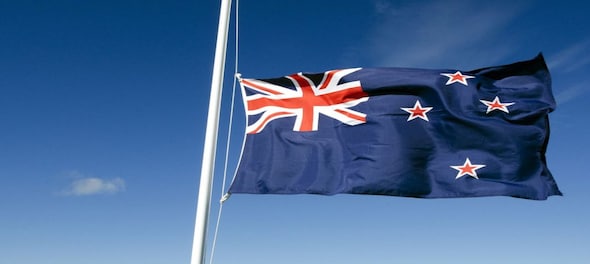
New Zealand’s central bank kept interest rates unchanged for a fifth straight meeting and softened its threat of a hike amid signs inflation pressures are waning. The local dollar fell.
The Reserve Bank’s Monetary Policy Committee held the Official Cash Rate at 5.5% Wednesday in Wellington, as expected by 22 of 24 economists surveyed by Bloomberg. The bank’s new forecasts show slightly less chance of a rate increase this year but no reductions until 2025.
“The risks to the inflation outlook have become more balanced,” the RBNZ said. “However, headline inflation remains above the 1-3% target band, limiting the Committee’s ability to tolerate upside inflation surprises.”
The RBNZ is reluctant to entertain a pivot to monetary easing because price pressures remain persistent and it is concerned that elevated inflation expectations could become entrenched. New Zealand’s inflation rate of 4.7% is well above the bank’s 2% goal and higher than many of its peers.
The New Zealand dollar dropped half a US cent after the decision as some investors and economists had been bracing for a surprise rate increase. The kiwi bought 61.22 cents at 2:15 p.m. in Wellington from 61.74 cents beforehand.
RBNZ Governor Adrian Orr will hold a press conference at 3 p.m. local time.
“We continue to expect the RBNZ will cut the OCR in November, with the risks to that view appearing more balanced now that the RBNZ has signaled some degree of comfort with very conflicting signals in the key data out over the recent months,” said Nick Tuffley, chief economist at ASB Bank in Auckland. “We think over coming months the hurdle for an OCR move in either direction remains high.”
‘Sustained Period’
The bank said it remains confident that the current level of the cash rate is restricting demand but a sustained decline in capacity pressures in the economy is required to ensure inflation returns to target.
“The OCR needs to remain at a restrictive level for a sustained period of time to ensure this occurs,” it said.
Policymakers globally have been pushing back against bets that rate cuts are imminent, saying they need to first be sure inflation is tamed.
The Reserve Bank of Australia has said it is not possible to rule out further interest rate increases, while US Federal Reserve officials have indicated they are in no rush to begin lowering their benchmark. Only one of the nine-member Bank of England monetary policy committee is currently pushing for cuts.
The RBNZ’s updated forecasts show the average OCR peaking at 5.60% this year compared to 5.69% in its previous projections. That implies a 40% risk of a hike. The forecasts suggest rate cuts starting in the first half of 2025.
Most economists think the OCR has peaked for this cycle and that the next move will be a cut. Still, there is a wide range of views on the timing, from as soon as May this year to as late as February 2025.
ANZ Bank and TD Securities were tipping a quarter-point hike to 5.75% today, and a follow-up increase in the second quarter that would take the OCR to a peak of 6%.
The RBNZ published fresh economic projections that show inflation is still expected to fall below 3% by the third quarter of 2024.
The central bank expects the economy will grow modestly this year and won’t slip into recession, buoyed by record immigration. New Zealand posted its biggest calendar-year jump in population since the end of World War Two in 2023.
“Recent high population growth is supporting aggregate spending, as evident in upward pressure on dwelling rents,” the RBNZ said.
Check out our in-depth Market Coverage, Business News & get real-time Stock Market Updates on CNBC-TV18. Also, Watch our channels CNBC-TV18, CNBC Awaaz and CNBC Bajar Live on-the-go!


Lok Sabha polls: EC disposes off 90% complaints related to MCC violations
May 14, 2024 4:45 PM
Jharkhand Lok Sabha elections 2024: All about INDIA bloc candidates
May 14, 2024 2:52 PM
SAD's Harsimrat Kaur declares assets worth ₹135 crore
May 14, 2024 1:18 PM
PM Modi files nomination for 3rd term from Varanasi Lok Sabha seat
May 14, 2024 10:15 AM

